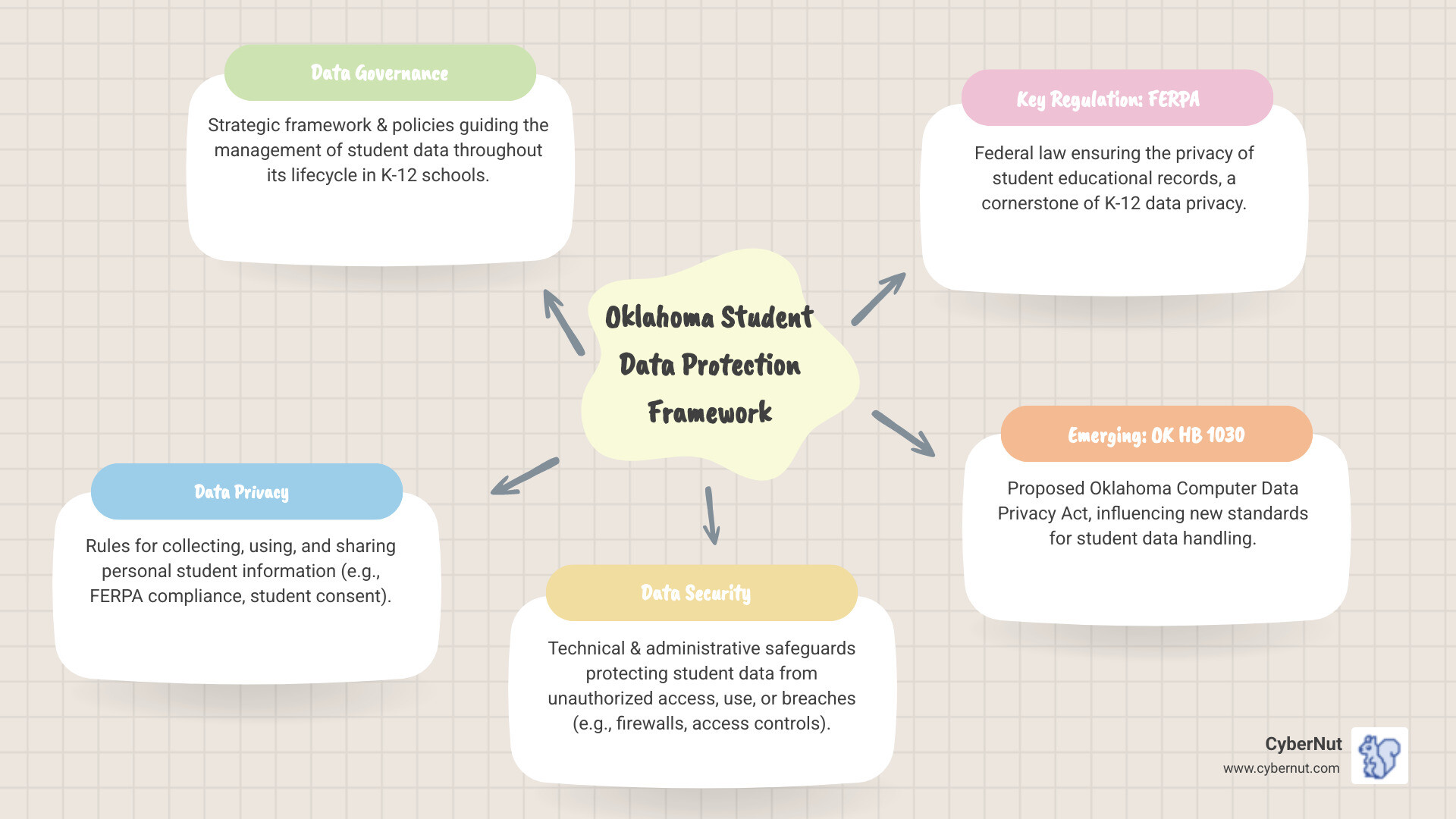
Oliver Page
Case study
October 24, 2025

The Oklahoma Data Governance Act is not a single, comprehensive law for K-12 schools. Instead, Oklahoma schools must steer a patchwork of regulations that includes:
Key Fact: While a proposed bill (HB 1030) passed the state legislature in 2023, it was never signed by the governor. This means Oklahoma currently lacks a comprehensive state-level data privacy law similar to California's CCPA.
For K-12 IT Directors in Oklahoma, the absence of a single, clear law creates confusion. This guide will help you piece together requirements from these multiple sources.
As Rep. Josh West noted when introducing the proposed privacy legislation, there are growing concerns about how personal data is collected and used. While his bill didn't become law, it highlights a trend that affects schools just as much as businesses.
The stakes are high for your district. Student data includes sensitive information like grades, health records, and home addresses. Protecting this data isn't just about compliance; it's about maintaining trust with parents and keeping your students safe.
Even without a comprehensive state law, your school has significant data protection obligations. Federal laws like FERPA set strict requirements, and you need to prepare for stricter rules ahead.

Oklahoma Data Governance Act terms made easy:
If you're looking for a single, comprehensive Oklahoma Data Governance Act for your school, it doesn't exist yet. Instead, Oklahoma uses a "patchwork approach" to data privacy.
The foundation starts with the Oklahoma Constitution, which establishes basic privacy rights. For K-12 schools specifically, the most important state law is the Oklahoma Student Data Accessibility, Transparency, and Accountability Act of 2013. This act is your primary state-level guide for managing student data, who can access it, and what safeguards are needed.
Crucially, federal law takes precedence when state and federal regulations overlap. This means your school must follow multiple federal mandates that provide strong, though separate, protections.
While Oklahoma hasn't passed a comprehensive data governance act for all entities, the state government has established a data governance framework for its own agencies through the Oklahoma Office of Management and Enterprise Services (OMES). This framework treats data as a valuable state asset that requires careful management and protection.
For state agencies, this means inventorying data, tracking access, and maintaining quality. Here's why this matters for your school: The data stewardship principles championed by OMES like establishing clear data ownership and setting quality standards are best practices K-12 schools should adopt. These principles add structure and accountability to how you manage the sensitive information entrusted to you.
Even without a single state privacy law, federal regulations create a solid foundation for student data protection. These are mandatory for every school in Oklahoma.
FERPA (Family Educational Rights and Privacy Act) is the cornerstone of student data privacy. It protects student education records and gives parents specific rights regarding them. Schools generally need written permission before releasing information from these records.
COPPA (Children's Online Privacy Protection Act) applies to online services directed at children under 13. It requires verifiable parental consent before collecting personal information from children. When your school uses educational apps or online tools, you must ensure those vendors are COPPA compliant.
CIPA (Children's Internet Protection Act) requires schools receiving E-rate discounts to implement internet safety policies, including technology to filter access to harmful content. This reflects your broader responsibility to create a safe online environment.
HIPAA (Health Insurance Portability and Accountability Act) can apply to schools in specific circumstances, such as if a school operates a health clinic that qualifies as a "covered entity." However, FERPA typically covers most student health records.
These federal laws, combined with Oklahoma's Student Data Act, create a comprehensive framework—it's just not consolidated into one document. For more guidance, see our insights on Cybersecurity for Educational Institutions. The bottom line is that you have clear obligations to protect student data, and the biggest risk is often untrained people. That's exactly why we created CyberNut.
In 2023, Oklahoma came very close to passing a comprehensive data privacy law. House Bill 1030, championed by Rep. Josh West, successfully passed both the House and the Senate but was never signed into law by the governor.
While this proposed Oklahoma Data Governance Act didn't become reality, its near-miss signals strong legislative interest in data privacy. Similar legislation will likely resurface. For K-12 schools, the smart move is to start preparing now rather than scrambling later.
Had HB 1030 become law, it would have applied to businesses operating in Oklahoma that meet certain thresholds, such as having an annual gross income exceeding $15 million and processing data for at least 50,000 consumers. While most schools would not meet these thresholds, some larger districts might have been impacted.
The bill's core principles included:
If HB 1030 had passed, Oklahoma residents would have gained several powerful rights, which would have translated into new obligations for covered entities.
To handle these rights, organizations would have needed to create processes for submitting verifiable consumer requests and responding within 45 days. A non-discrimination provision would have prohibited penalizing people for exercising their privacy rights.
Even though this bill didn't pass, these provisions provide a roadmap for future legislation and good Data Processing practices.
HB 1030 included a clear enforcement mechanism. The Oklahoma Attorney General would have held sole enforcement authority. The bill did not include a private right of action, meaning individuals would file complaints with the Attorney General rather than suing organizations directly.
The proposed penalties were significant: up to $7,500 per intentional violation and $2,500 per unintentional violation. These figures underscore why proactive data governance is far less expensive than facing an enforcement action. One of the most common vulnerabilities is phishing; you can get a complimentary phishing audit for your district at https://www.cybernut.com/phishing-audit to see where you stand.
Even without a comprehensive Oklahoma Data Governance Act, proactive data management is essential. Building trust with your community depends on how well you protect their children's data. Every school district needs a solid Data Security and Privacy Plan to outline responsibilities, safeguards, and incident response steps.
For an example of excellent data governance, we can look to institutions like the University of Oklahoma. Their policy treats data as a valuable asset, balancing protection with accessibility—a model that K-12 schools can adopt.

Saying "everyone is responsible for data security" is not enough. You need specific people with clear responsibilities.
This structure, similar to what's found in strong University Leadership frameworks, creates clear accountability.
Not all data carries the same risk. Classifying your data helps you apply the right level of protection.
Once classified, apply security measures based on sensitivity:
The NIST Glossary offers detailed definitions to guide your framework development. However, even the best technical safeguards can't prevent human error. That's why staff training is critical. See how vulnerable your district might be to phishing with a complimentary phishing audit at https://www.cybernut.com/phishing-audit.
Navigating data privacy can be complex. Here are concise answers to common questions about the Oklahoma Data Governance Act and its implications for K-12 schools.
No, Oklahoma does not have a single, comprehensive Oklahoma Data Governance Act specifically for K-12 schools. Instead, districts must follow a combination of the Oklahoma Student Data Accessibility, Transparency, and Accountability Act 2013, federal laws like FERPA, COPPA, and CIPA, and best practices from state agency data governance principles.
Without a doubt, the Family Educational Rights and Privacy Act (FERPA) is the most important. This federal law governs the privacy of student education records for virtually every public school in the country. It dictates who can access student records and under what conditions. While Oklahoma's state-level act is important, it operates within the broader framework established by FERPA.
With new legislation likely on the horizon, proactive preparation is key. The best approach involves several core strategies:
By focusing on these areas, your school will build a resilient data environment ready for whatever the future holds.
While a comprehensive Oklahoma Data Governance Act doesn't exist yet, your responsibility to protect student data is real and urgent. Oklahoma schools must steer a mix of state law, powerful federal mandates like FERPA, and the clear legislative trend toward stronger privacy protections, as seen with the near-miss of HB 1030.

Waiting for a perfect law is not a strategy. The schools that will thrive are those taking proactive steps today building data governance frameworks, defining roles, and investing in their people.
At CyberNut, we know that the human element is your biggest vulnerability and your strongest potential defense. A single click on a phishing email can bypass the best technical safeguards, leading to data breaches and a loss of community trust that takes years to rebuild.
This is why we focus on building a culture of awareness. Our automated, gamified micro-trainings are designed for busy K-12 educators, fitting seamlessly into their day to build real cybersecurity skills without adding to their workload. We turn your staff into a proactive line of defense.
By investing in robust data governance and staff training, you aren't just aiming for compliance. You are building trust with parents, protecting students from harm, and positioning your district as a leader in data security.
So what's your next step? Start by understanding where your vulnerabilities lie. Get a complimentary phishing audit for your district at https://www.cybernut.com/phishing-audit. This no-cost audit reveals how your staff responds to realistic phishing threats and provides a clear roadmap for strengthening your human defenses.
Continue building your knowledge by exploring our comprehensive collection of insights and guides at https://www.cybernut.com/resources. Oklahoma's data privacy landscape is evolving. Together, we can create safer digital learning environments where students can learn and grow without compromising their privacy or security.

Oliver Page

Some more Insigths


Back